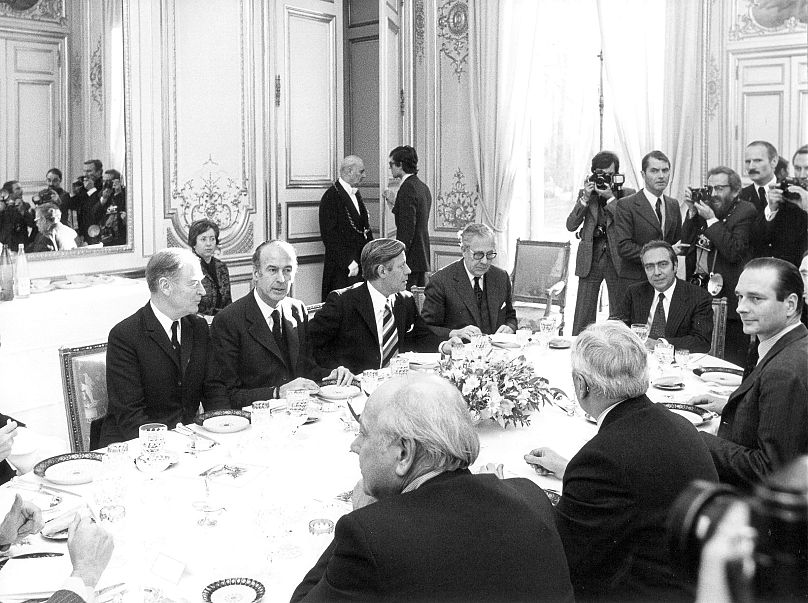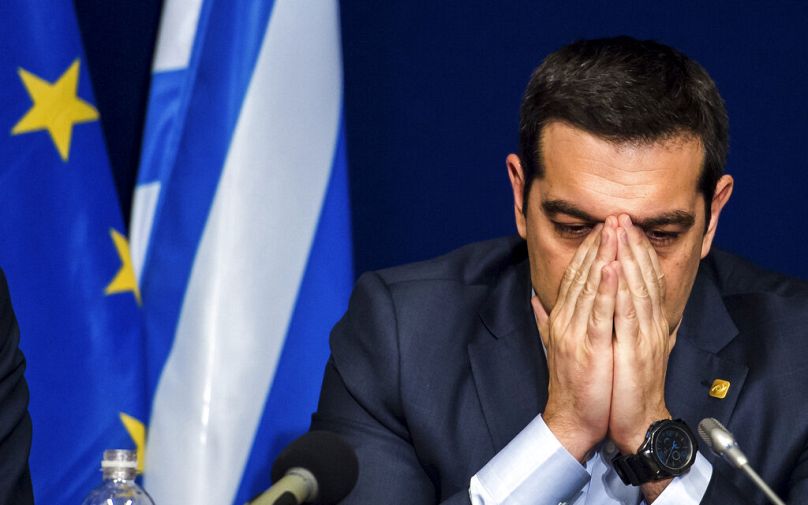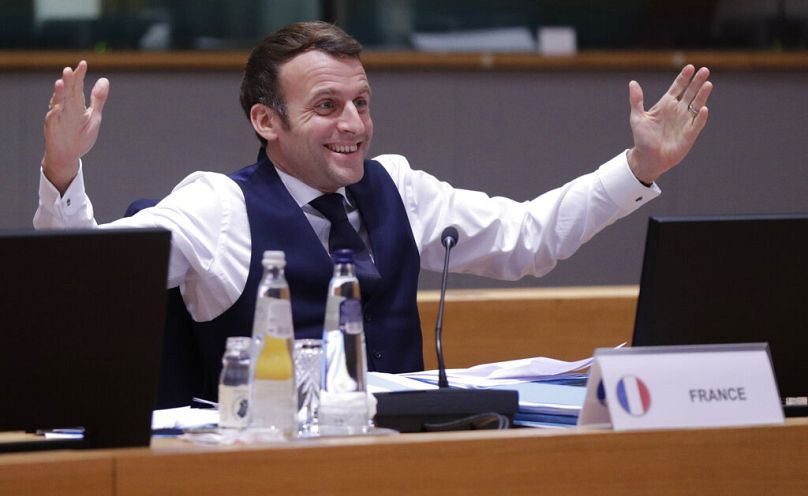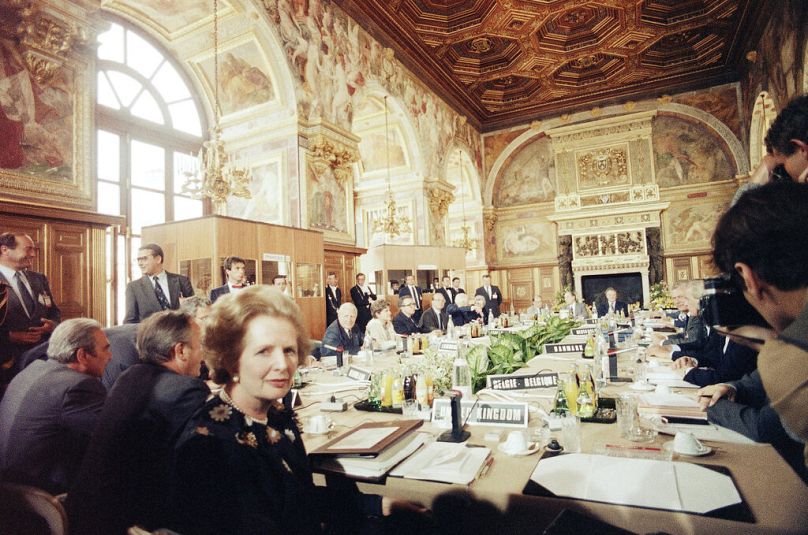Everything you wanted to know about EU summits but were afraid to ask.
There’s a lot of fanfare when EU leaders get together in Brussels. Whether the summits succeed or fall apart, they tend to take on legendary status and leave their mark on the history of the bloc.
 ADVERTISEMENT
ADVERTISEMENT
 ADVERTISEMENT
ADVERTISEMENT
But why do EU leaders hold summits, and how do they work?
What is the European Council?
The EU summit is a meeting of the European Council which is the group of leaders running countries that are members of the EU.
It's not to be confused with the Council of the European Union, which gathers national ministers and deals with legislation and policy matters.
The 27 heads of state and government meet up to six times per year to set the course of EU politics. They do not negotiate or adopt laws but instead set the policy agenda.
Since 2009, the person chairing the summits is the European Council president who sends out a formal invitation letter laying out the pressing problems of the bloc. The current president is former Belgian Prime Minister Charles Michel.
The president then chairs the negotiations in order to adopt conclusions. This is the final statement agreed to by all 27 leaders.
In reality, most of the groundwork for an EU summit is done weeks ahead by civil servants and diplomats before the big names arrive in Brussels. In fact, draft conclusions are often leaked ahead of the summit.
Why does the EU hold summits?
In the 1950s when EU leaders wanted to discuss matters important to the European Coal and Steel Community (ECSC), there was not a clear meeting calendar, and meetings were improvised.
The idea to have a club of EU leaders to talk shop on a regular basis was the brainchild of former French President Valéry Giscard d’Estaing in 1974. The following year, EU leaders started meeting three times a year.
The reason for having a meeting of all leaders was to have a form of collective leadership. No matter the size of the member state, everyone had a seat at the table.
Nowadays, EU leaders meet at least twice every six months and the Council president can call special summits on a particularly urgent issue.
EU summits are needed to get agreement on issues that matter across all EU countries - be it the euro currency (fears of Grexit), a new trade partnership with a former EU country (Brexit) or how to deal with the fallout of a pandemic (COVID-19 recovery funds).
EU summits are generally the most critical in periods of crisis, which is why they can become somewhat tense and run into extra time.
Why do EU summits last so long?
EU summits have the reputation of starting at lunchtime and going well into the early hours of the next morning. This is because getting an agreement between the 27 leaders is not always easy.
“I think that European history is full of disagreements, negotiations and in the end, compromises,” said the Greek Prime Minister Alexis Tsipras in 2015 as the Greek debt crisis talks rumbled on. In the end, it was a Greek compromise that put an end to the spectre of Grexit, but it came with painful austerity measures.
Certain decisions require only consensus or qualified majority votes, but others require a unanimous agreement. This means just one country can veto the conclusions of 26 others.
In 2020, Poland and Hungary threatened to veto the bloc’s €1.8 trillion budget over concerns that a mechanism would make some funds conditional on a country's respect for core European values.
Fortunately, an 11th-hour deal was agreed with Warsaw and Budapest, averting a potential crisis.
Back in 2011, however, when Britain was still a member of the club, the then David Cameron government wielded its mighty veto on an EU-wide treaty change late into the night, much to the frustration of his peers.
The remaining 26 member states eventually went ahead without the Brits, with Prime Minister Cameron saying the agreement was not in the UK’s interests.
Longest EU summit ever
Other summits have legendary status simply for their sheer length.
In July 2020, a mammoth meeting went on in Brussels for over 80 hours between the Friday evening and early hours of Tuesday. The negotiations were over the same budget and coronavirus recovery fund that the Hungarians and Poles tried to block.
The Greek debt crisis had been hogging the headlines at EU summits for years when in 2015, another tense EU summit was held amid the spectre of Grexit.
“We haven’t reached the point yet where I could say that we have an agreement, but I will work until the last minute, until the last second, until the last millisecond, in order to protect the euro-project from failing," said then-European Commission President Jean-Claude Juncker in June 2015.
By July, a referendum had been held in Greece rejecting the terms of the bailout. A week later, after 17 hours of negotiations in Brussels, Greek Prime Minister Alexis Tsipras conceded to cuts and painful austerity measures.
But the top prize goes to the Nice summit in December 2000, where EU leaders talked for 90 hours. The resulting compromise was the Treaty of Nice - an attempt to reform EU institutions to allow for eastern expansion which would happen by 2004.
Clashing over cash
There have also been some fiery moments between leaders, especially when it comes to money.
In 1979, back when the EU was still the European Communities (EC), UK Prime Minister Margaret Thatcher had sharp words for EC heads of state and government when arguing in favour of a British rebate, which would stop the UK from paying more into the collective budget than what it received in subsidies.
The most famous of these words were, “I want my money back”, and they would not be the last time the Iron Lady clashed with her European counterparts, with the dispute over funds going on for five years, ending in a Thatcher victory.
Though the characters may change, the battles over money remain present.
As EU leaders were battling out a coronavirus recovery fund, the number of handouts and the respect of rule of law became major sticking points.
The so-called "Frugal Four" --Austria, Sweden, Denmark and the Netherlands -- announced a counter-proposal, binning the idea of debt-pooling and long-term EU budget increases.
When leaders finally reached a deal after four days of talks, French President Emmanuel Macron hailed the deal as a "historic day for Europe".
Former German Chancellor Angela Merkel said "extraordinary events" required "extraordinary new methods," while Spain’s Prime Minister Pedro Sanchez likened the recovery package to Europe’s post-war Marshall Plan.
However, Hungary and Poland remained unhappy with the terms of the deal, eventually seeking guidance from the European Court of Justice on the legal issue of tying EU funds to values.
"The sign of a successful European compromise is that no one loves it," said Rebecca Christie, a visiting fellow at the Brussels-based think tank Bruegel, of the deal in July 2020.
While the summits are often written up in headlines as epic battles between national leaders with winners and losers, they normally come down to compromise.
Every weekday, Uncovering Europe brings you a European story that goes beyond the headlines. Download the Euronews app to get a daily alert for this and other breaking news notifications. It's available on Apple and Android devices.














